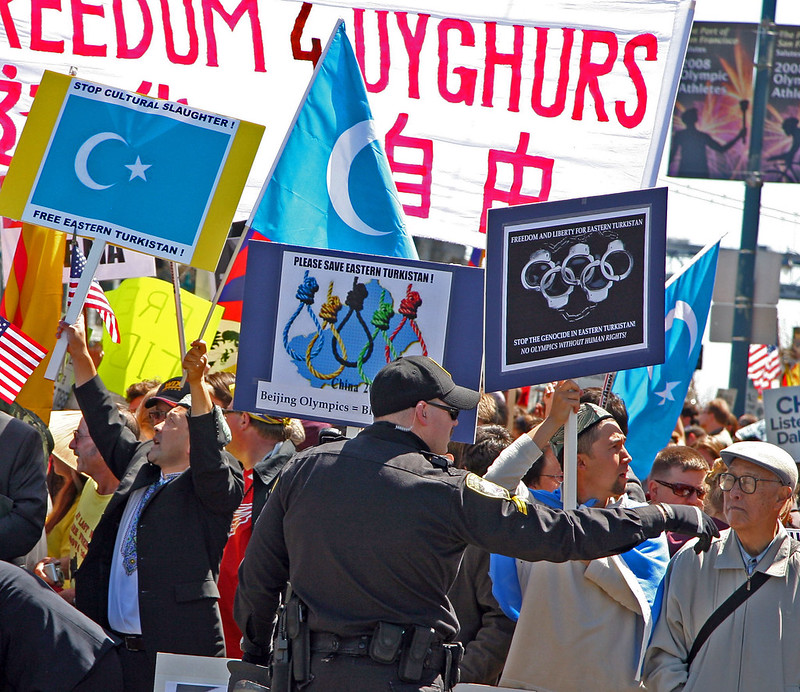China’s human rights allegations in Xinjiang now have a damning title: crimes against humanity.
Since 2009, China has been under a slow-burning flame, with human rights organizations, media outlets, and scholars worldwide for allegedly committing crimes against humanity. In the Autonomous Region of Xinjiang, China has actively persecuted the minority population of Uyghur Muslims by establishing forced labour camps, sterilization methods, cultural assimilation, and detention centers should citizens disobey Chinese cultural practices. While ethnic conflict is not new for China’s relations with Asian and ex-Soviet states, this is a landmark case in which the international community is demanding accountability and uncovering significant evidence to support their claims.
The region of Xinjiang, or East Turkestan, has remained a highly-contested geographical area. Located at the westernmost point of China, the province borders Mongolia, Russia, Kazakhstan, Kyrgyzstan, Tajikistan, Afghanistan, Pakistan, and India— along the historic Silk Road. Xinjiang is home to a wide range of recognized ethnic minority groups, most prominently, those who are from Turkic origin– the Uyghurs. While the ethnic Han Chinese group also lives in Xinjiang, they do not share the same lived experiences.
In Xinjiang, Uyghurs face an alarming number of violations to internationally-recognized human rights. Destruction of generational bonds to Uyghur culture occurs in boarding schools and detention camps, where children are separated from their families, parents are forced into dangerous workplaces, and the population at large is displaced by practicing religion or observing holidays. Amnesty International reports that over one million Uyghurs live in internment camps and are subjected to cruel and degrading treatment, including torture. Mass sterilization practices take place in hospitals, with an estimated 84 percent decline in the Uyghur population growth rate within a three-year period. Measures taken by the Chinese Communist Party (CCP) involve mandatory birth control practices, either by IUD insertions or tubal ligation sterilization, aimed to target at least 80 percent of women of childbearing age. These statistics are staggering when considering that 80 percent of all IUD placements were performed in Xinjiang, despite the province accounting for a mere 1.8 percent of China’s population.
Does this sound familiar? If you said yes, that is because it is the formal practice of forced cultural assimilation that has been witnessed amongst other Indigenous groups internationally. Beginning in the 19th century, Canada established Residential Schools, explicitly aimed at assimilating Indigenous children into broader Canadian society and to destroy traces of native history. This involved forced language re-education, Christian practices, physical and sexual abuse, and complete alienation from their communities. Effects of Canada’s cultural genocide are present today, with a large portion of Indigenous people taking strides for language revitalization, land reclamation, and seeking reparations for the injurious actions taken by the Canadian government. Cultural assimilation of ethnic minorities and Indigenous groups are also seen in Brazil, South America, New Zealand, Australia, and other countries worldwide. Observed similarities between these instances of colonial legacies include religious oppression, purposeful spreading of diseases, forced re-education, socialization into unfamiliar cultures, and punishment should they differ from European – mainly Anglo-dominant – practices.
China has denied all allegations of human rights abuses, genocide, and maintains that they are operating well within their policy and active scope to combat the “three evils” in Xinjiang. The PRC defines terrorism, separatism, and religious extremism as the main pillars of their security and military objectives. Much of Chinese literature, academia, and press releases echo the same statement, insisting that they are the true nation that can claim land to this territory and should operate under strictly Chinese regimes and social values. Their stated goal of the aforementioned camps is to “rid them of terrorist or extremist leanings.”
China’s widespread censorship laws have made it difficult, and nearly impossible for journalists to freely report on the Uyghur genocide in China. Nationalism is instilled by the PRC, starting with the Patriotic Education Campaign in 1990, against the “Century of Humiliation” undergone by Western powers throughout the Qing dynasty. This has formed China’s dominant theory for engaging in international relations – once a country is undergoing territorial and cultural strife, they aim to reassert their capabilities as a growing world power. Subsequently, citizens living both in China, and Chinese expatriates, are prohibited from deviating from this mentality or explicitly critiquing government policy and practices. Prohibited topics include Taiwan, Xinjiang, Tibet, and human rights abuses which could disparage the reputation of China, in the eyes of Beijing. This principle is extended to foreign and Chinese media outlets – should published reports include information differing from official government statements on any topic, they are either removed from platforms or face repercussions. A 2020 report on China’s media accessibility from the International Federation of Journalists confirmed that Beijing actively offers journalists monetary incentives in exchange for disseminating information in favour of Chinese narratives, with state-sponsored coverage on Xinjiang arguing that “the allegations of genocide are preposterous,” amid the state-led campaign for “Cracking down on Fake News.” Consequently, while journalists may undertake their own investigative research, China further problematizes the credibility of reporting by developing a counter-strategy.
Notably, Human Rights Watch has implicated China countless times, condemning Xi Jinping’s Administration for their breach of international human rights laws. Typing “Human rights for Uyghurs in China” results in a wide range of journalistic coverage, attempting to uncover further details on China’s actions. The (admittedly, late) United Nations (UN) Human Rights’ 2022 report on human rights concerns in Xinjiang has confirmed the allegations against China for “serious human rights violations” and “suspicious deaths” in re-education centers “may constitute… crimes against humanity.” Containing sections identifying governmental abuses of power, the report details religious expression, privacy, freedom of mobility, reproductive rights, and employment and labour issues in Xinjiang. While the UN report makes no mention of the term “genocide,” its publication successfully rose global awareness and recognition of the attempt to eliminate Uyghurs from Xinjiang.
Zhang Jun, China’s ambassador to the UN has since announced that the report is in complete malintent; “its purpose definitely is to undermine China’s stability and obstruct China’s development.” Liu Yuyin, China’s spokesperson to Geneva further argued that Michelle Bachelet (former High Commissioner for the UN Human Rights Branch) and any UN organizations should avoid interfering in China’s internal affairs. With the plethora of Foreign Ministers and internationally-recognized groups crafting careful political statements advocating for the immediate attention towards returning human rights to the region, Beijing appears to be in what is now a slippery slope for answering long-coming questions on their horrific practices.
China is responsible for upholding conventions outlined in Convention on the Punishment of the Crime of Genocide (1948) and the UN Declaration on Human Rights. Further, they are obligated to provisions outlined in international law, for responding to accusations of crimes against humanity, and should be available to respond to — rather than wholly reject— questioning. So far, they have failed to do so. The international community has failed to place significant pressure in order to provide upheaval of China’s practices. Despite damning evidence and firsthand accounts attesting to the current claims of abuse and genocide, the status quo has not been disrupted and the situation in Xinjiang persists. China’s partnerships have not been affected. Unfortunately, it is clear that should conditions persist, the international community has little influence without taking drastic measures– say, direct intervention. China does not take these accusations lightly, so one can only imagine what reaction would be prompted should foreign interference on Xinjiang’s soil occurs. For over a decade, the world has known about the situation. Yet, how has it taken over a decade for interference? China’s state structure and principles of non-intervention have seemed to extend, creating a fortress that appears impenetrable to foreigners.
Edited by Liz Bredt

Olivia Bornyi joined the Catalyst team in January 2023, bringing with her a fresh and critical analysis of political relations and development studies. She is entering her fourth year of Political Science and International Development Studies at McGill University, and just completed a semester abroad at Sciences Po in Paris, France! Olivia’s research interests include security studies, social discourses on political relations, humanitarian diplomacy, and comparative studies of development. Outside of academics, Olivia enjoys planning future travels, knitting, and discovering new cafés in Montréal.

